Imperialism
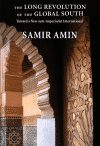
In this second volume of his memoirs, Samir Amin takes us on a journey to a dizzying array of countries, primarily in the Arab World, Africa, Asia, and Latin America, recounting in detail the stages of his ongoing dialogue over several decades with popular movements struggling for a better future. Along the way, we meet government leaders, activists in popular movements, and working people, both rural and urban. As in his many works over the years, The Long Revolution of the Global South combines Amin’s astute theoretical analyses of the challenges confronting the world’s oppressed peoples with militant action. | more…
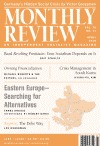
In the midst of the U.S.-directed coup attempt against the Bolivarian Republic of Venezuela in January–February, Donald Trump delivered a number of verbal attacks on socialism in Venezuela, Cuba, and Nicaragua. The immediate object was to justify U.S. attempts to overthrow the Bolivarian Republic. The less immediate, but hardly less important, goal was to tarnish the growing social democratic (self-styled democratic socialist) movement in the United States, associated with figures like Bernie Sanders and Alexandria Ocasio-Cortez. In order to safeguard their ambitious social-reform program, the new coterie of Democratic Party socialists have thus sought to separate themselves from Venezuela and other Latin American socialist states, presumably abandoning these countries to their fates at the hands of U.S. imperialism. This raises the historic question of social imperialism—a policy of social reform at home and imperial hegemony abroad. | more…
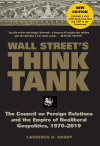
The Council on Foreign Relations is the world’s most powerful private foreign-policy think tank and membership organization. Dominated by Wall Street, it claims among its members a high percentage of past and present top U.S. government officials as well as corporate leaders and influential figures in the fields of education, media, law, and nonprofit work. Wall Street’s Think Tank follows the Council on Foreign Relations from the 1970s to the present, and this new paperback edition includes an Afterword discussing the Trump Administration and the Council. | more…

(Introduction by Aijaz Ahmad)
Radical political economist Samir Amin (1931–2018) left behind a cherished oeuvre of Marxist writings. Amin’s intellectual range—from economics to culture—was admirable, and his lessons remain essential. Monthly Review Press is honored to publish this volume, culled from the Monthly Review magazine, of ten of Samir Amin’s most significant essays written in the twenty-first century. The collection is introduced by Amin’s friend and comrade, the Marxist philosopher Aijaz Ahmad, who provides a comprehensive survey of Amin’s life and path-breaking work. Ahmad also offers a contextual focus by which to read such stunningly astute pieces as “Revolution or Decadence?” and “Contemporary Imperialism.” | more…
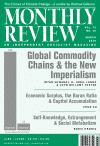
The present ongoing coup attempt organized in Washington is simply the latest in a series of such attempts by the U.S. government to overthrow the Bolivarian Republic of Venezuela over the last two decades. It can be seen as having three interrelated motives: (1) the destruction of Venezuelan socialism, (2) regaining control of Venezuela’s oil (the largest petroleum reserves in the world), and (3) reasserting U.S. hegemony over Latin America. | more…

To comprehend twenty-first-century imperialism we must go beyond analysis of the nation-state to a systematic investigation of the increasing global reach of multinational corporations or the role of the global labor arbitrage. At issue is the way in which today’s global monopolies in the center of the world economy have captured value generated by labor in the periphery within a process of unequal exchange, thus getting “more labour in exchange for less. The result has been to change the global structure of industrial production while maintaining and often intensifying the global structure of exploitation and value transfer. | more…

In 1957, in the Political Economy of Growth, Paul Baran made a seminal contribution to our understanding of the connection between economic surplus—a concept he introduced into the development discussion—and growth. Given that the ruling class controls the surplus of society, how the surplus is used—whether it is invested, consumed, or simply wasted—is at its discretion. The effective utilization of surplus implies a reasonable rate of capital accumulation and economic development. In the following study of the utilization of surplus I compare the size of surplus and gross capital formation in a variety of countries starting from the mid–nineteenth century. | more…

Less than two decades into the twenty-first century, it is evident that capitalism has failed as a social system. The world is mired in economic stagnation, financialization, and the most extreme inequality in human history, accompanied by mass unemployment and underemployment, precariousness, poverty, hunger, wasted output and lives, and what at this point can only be called a planetary ecological “death spiral.” Many of the symptoms of the failure of capitalism are well-known. Nevertheless, they are often attributed not to capitalism as a system, but simply to neoliberalism, viewed as a particular paradigm of capitalist development that can be replaced by another, better one. A critical-historical analysis of neoliberalism is therefore crucial both to grounding our understanding of capitalism today and uncovering the reason why all alternatives to neoliberalism and its capitalist absolutism are closed within the system itself. | more…
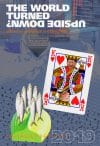
A World Turned Upside Down? poses two overarching questions for the new period opened by the Trump election and the continued growth of right-wing nationalisms. Is there an unwinding of neoliberal globalization taking place, or will globalization continue to deepen, but still deny the free cross-border movement of labor? | more…

In the last piece he wrote before his passing, Samir Amin revisits, for our age, the most important revolutionary document of all time, the Communist Manifesto. In a fitting conclusion to the work of a great revolutionary intellectual, Amin seeks nothing less than to explain the changing world trajectory from 1848 to 2018. Against the persistent vision of the globalized development of capitalism, he puts forward a vision for the transformation of the world through revolutionary processes—breaking with the submission to the deadly vicissitudes of the decadence of civilization.

Linda Backiel is a criminal defense attorney practicing in San Juan, Puerto Rico. | more…
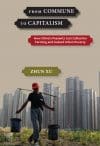
In the early 1980s, China undertook a massive reform that dismantled its socialist rural collectives and divided the land among millions of small peasant families. Known as the decollectivization campaign, it is one of the most significant reforms in China's transition to a market economy. From the beginning, the official Chinese accounts, and many academic writings, uncritically portray this campaign as a huge success, both for the peasants and the economy as a whole. This mainstream history argues that the rural communes, suffering from inefficiency, greatly improved agricultural productivity under the decollectivization reform. It also describes how the peasants, due to their dissatisfaction with the rural regime, spontaneously organized and collectively dismantled the collective system. A closer examination suggests a much different and more nuanced story. By combining historical archives, field work, and critical statistical examinations, From Commune to Capitalism argues that the decollectivization campaign was neither a bottom-up, spontaneous peasant movement, nor necessarily efficiency-improving. | more…











